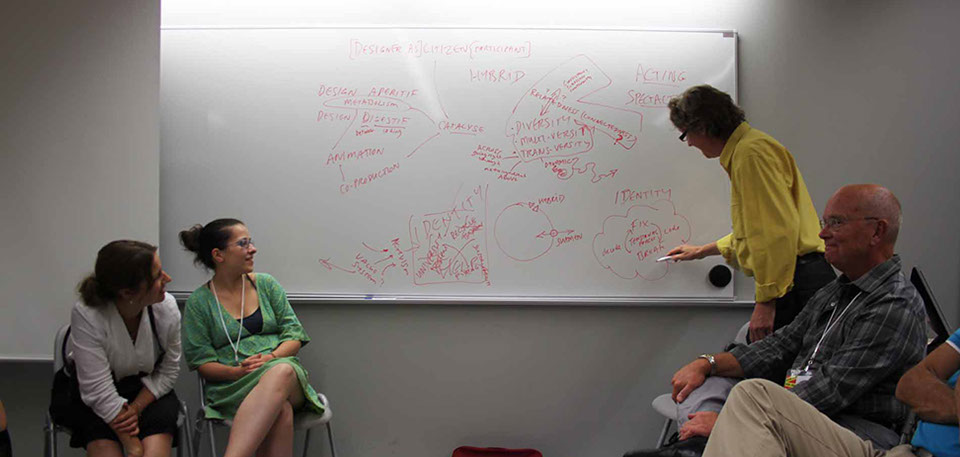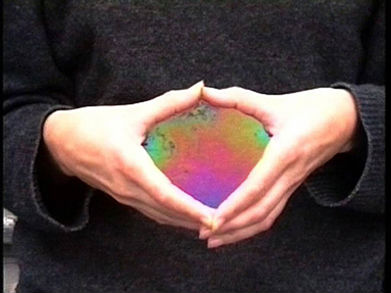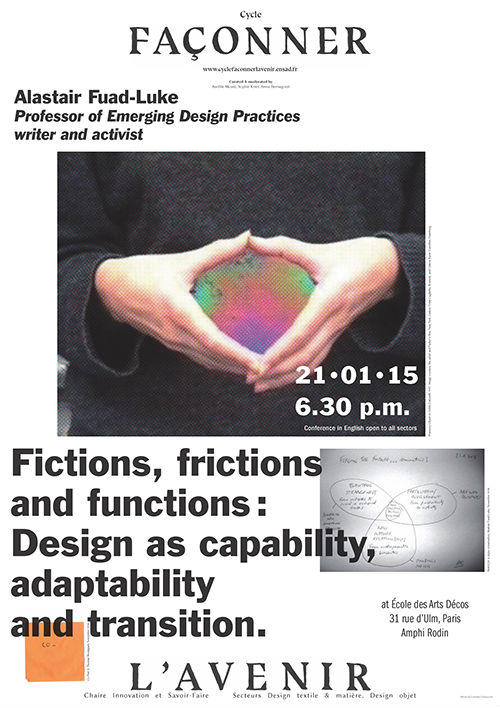ALASTAIR FUAD-LUKE
I work as a design facilitator, educator, writer and activist. My books include Design Activism and The Eco-Design Handbook. A new book Agents of Alternatives: Re-designing Our Realities is in press. Currently I am professor of Emerging Design Practices at Aalto University, exploring design approaches based upon openness, sharing and co-design/ creation/ production/ consumption. I see participatory design for sustainability as a means to catalyse social well-being and alternative economies which nourish Our Commons, see Window874. Experiments embrace Mode Uncut and ongoing projects: a Codesign Manual for LADEC and SHIFT-Support Systems for Sustainable Entrepreneurship and Transformation.
-Alastair Fuad-Luke

Outline of talk:
These days, I talk about the ‘socialisation of design-ing’ because the boundaries and interchange between ‘authorised’ (professionally trained) and ‘non-authorised’ designers (professional amateurs, other professionals and citizens) is being vigorously challenged. This is emergent. We are all aware of its potency. As authorised designers you might be asking ‘What is my role as a designer in our current societal transition?’ Or, you might have concerns about whether you will find a job. To help, I wish to focus you on the notion that designers are ideally placed to (co-)create and explore new roles to challenge existing patterns and modes of working and to catalyse embryonic movements. I will share some emergent practices.
My vision of the design field has always been well beyond markets and public services, often addressing critical, contingent conditions of our societies in a search for better symbiosis with our natural world. Design is a storytelling activity to motivate people to change their perspectives, behaviours or both. It involves fictions about what could be. It must create friction to engage people. And, it should offer functions that meet real needs. Above all, design must not create ever more dependency on stuff, services and experiences (what I call ‘pharmakon design’) but to set alight and raise the capability of people; to increase their autonomy, in- and inter-dependence and adaptability; and to enable them to sustain themselves. Of course, this requires communal, not just individual, endeavour. And it takes time. We need to co-envision possibilities for living and working well, in a more resilient way. We need authorised designers to embrace the non-authorised designers to explore, experiment and motivate. We need radical transition.


The talk will be followed by an informal session, in which the public will imagine a movement that could set a radical societal transition rolling in relation to urban ecology. What does tomorrow’s green, sentient city ask for? Which fictions, frictions and functions will it need to gain momentum?
Exercise: design a collective act that encourages solidarity, conviviality, and trust in the context of a diverse urban ecology. Create a prototype ‘gift’ to be given to a friend, family member or stranger to encourage them to engage with their immediate urban ecological environment.
“My idea of beauty s it must tell the ecological truth, and it must tell the social truth. It must tell this truth in an aesthetically and culturally relevant way. And it must have some more imaginative ways of making economies. Or it won't get any friction.” – Alastair Fuad-Luke in conversation with design critic Ed van Hinte, Utrecht Manifest NO. 5, Dutch Design Week, 2014.


LINKS
Fictions, frictions and functions:Design as capability, adaptabilityand transition (pdf)
Further reading
Design Activism: Beautiful Strangeness for a Sustainable World, Alastair Fuad-Luke, Routledge, 2009.
The Eco-Design Handbook, A Complete Sourcebook for the Home and Office, Alastair Fuad-Luke, Thames & Hudson, 2002, 2005, 2009.
Recent writing includes: ‘Open Participatory Designing for an Alternative Fashion Economy’, with Anja-Lisa Hirscher, in Sustainable Fashion: New Approaches; ‘Design Activism: Challenging the Paradigm by Dissensus, Consensus and Transitional Practices’, in The Handbook of Design for Sustainability; ‘Co-designing Services in the Co-futured City’, in Service Design: On the Evolution of Design Expertise.
